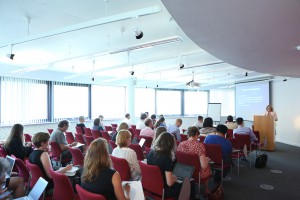September 9, 2014, by BEIS Blogger
Event explores academic and industrial collaborations with Australia
Over 50 staff and students at the University recently attended an event which focused on developing collaborative engagements between Nottingham and Australia.
Held at the University’s own Innovation Park, those with a shared interest for Australia came together to discuss the ways in which university staff and students can partner with higher education institutions in the country.
The event, organised by the Asia Regional Strategy Group with support from the Asia Business Centre, International Office and Research and Graduate Serivces, provided a platform for delegates to share information on opportunities for research, business engagement, teaching partnerships as well as staff/student mobility.
Why Australia?
Assistant Pro-Vice-Chancellor (Asia), Professor Michèle Clarke, opened the event with a presentation on the Asia Regional Strategy Group (ARSG) and the case for prioritising Australia.
Michèle Clarke discussed the University’s longstanding links with the Far East and the two international campuses in China and Malaysia, but suggested that researchers and students alike should also be turning their attention to building relationships with Australia.
As part of the ARSGs 2015-2020 vision, Professor Clarke reinforced the goal to be the international partner of choice for Global Asian top 100 and U21 partner organisations across the Asian Strategic Region, including Australasia.
On the subject, Professor Clarke said: “We aim to achieve this by using our global top 100 position more effectively to leverage high quality partnerships in countries like Australia that build on our unique UK strengths as well as our international campus position. We will also proactively target research and teaching partnerships with the leading top 100 and U21 institutions, such as those in Australia.”
Opportunities available for Nottingham-Australia collaborations
The positivity towards the prospect of working with Australia was shared by fellow speakers Richard Masterman and Steven Hardy from the Research and Graduate Service, as they talked about the existing opportunities for international research collaborations.
Steven emphasised the importance of University of Nottingham-Australia publications collaboration, particularly with the Group of Eight Universities (Australia’s equivalent of the Russell Group Universities): “Citations per publication and field-weighted citation impact (FWCI), significantly increases when joint between The University of Nottingham and Group of Eight Institutions in Australia”.
Dr Chris Dodds, from the Faculty of Engineering, spoke about links with Industry using the Rio Tinto Centre for Emergent Technology as a case study. Dr Dodds gave expert advice on how best to engage with Australia, including tips on how to communicate around the time difference and to ensure that engagement is delivery focused. The best suggestion that Chris offered however, was to travel!
Shelagh Whittleston, Education Manager at the Australian Embassy and Mission in Brussels, provided an overview of the Australian higher education system including the frameworks in place for partnerships and collaboration, including but not limited to;
- The Australia-EU Framework Agreement (with research, innovation & education as major features of the agreement)
- Education & Training Policy Dialogue (AQF-EQF alignment)
- Joint Science and Technology Co-operation Committee (including Connecting Australian & European Science & Innovation Excellence)
Ms. Whittleston also shed light on the new strategies are and money that is available for student and researcher mobility through programmes such as; Erasmus Plus, Erasmus Plus for Partners and Horizon 2020.
Industry-Academic Collaboration
The opportunities for industry engagement were also discussed by Ms. Whittleston, particularly through the framework Connecting Australian & European Science & Innovation Excellence (CAESIE). CAESIE aims to link SMEs and researches in Europe and Australia through three broad priority areas
- Clean Energy
- Healthy ageing through enabling technologies
- Sustainable cities
Jason Feehily, Head of the Asia Business Centre (ABC), further emphasised the support available from the ABC team to help university staff and students exploit the opportunities available in the rapidly expanding markets of South East Asia and beyond.
“We thoroughly encourage two way engagement activity with Asia and can provide the relationship management you need to liaise with key businesses and connections overseas,” said Jason. “Our team is here to help you establish international links; we do this by facilitating Asia Visit programmes and inward delegations to the UK, as well as supporting student employability and Asia alumni engagement.”
Keynote speaker Professor Michelè Clarke concluded the event with a summary of the various International frameworks in place that can generate exciting research partnerships between the University of Nottingham and Australia.
“As we have seen today there are good opportunities available to collaborate with Australia through publications, PhD programmes, researcher links through mobility and exchange, industry links as well as prospects for professional development & engagement”.
For more information on how you can collaborate with Australia please contact Anneke Love, Marketing and Events Officer, Business Engagement & Innovation Services.
T: 0115 74 84555
E: anneke.love@nottingham.ac.uk
No comments yet, fill out a comment to be the first


Leave a Reply